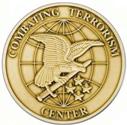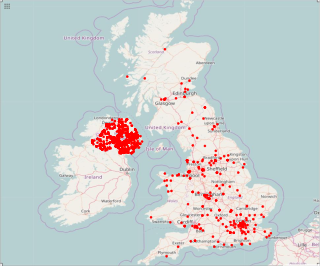Related Research Articles

Terrorism, in its broadest sense, is the use of intentional violence and fear to achieve political or ideological aims. The term is used in this regard primarily to refer to intentional violence during peacetime or in the context of war against non-combatants. The terms "terrorist" and "terrorism" originated during the French Revolution of the late 18th century but became widely used internationally and gained worldwide attention in the 1970s during the Troubles in Northern Ireland, the Basque conflict, and the Israeli–Palestinian conflict. The increased use of suicide attacks from the 1980s onwards was typified by the 2001 September 11 attacks in the United States.

Nuclear terrorism refers to any person or persons detonating a nuclear weapon as an act of terrorism. Some definitions of nuclear terrorism include the sabotage of a nuclear facility and/or the detonation of a radiological device, colloquially termed a dirty bomb, but consensus is lacking. In legal terms, nuclear terrorism is an offense committed if a person unlawfully and intentionally "uses in any way radioactive material … with the intent to cause death or serious bodily injury; or with the intent to cause substantial damage to property or to the environment; or with the intent to compel a natural or legal person, an international organization or a State to do or refrain from doing an act", according to the 2005 United Nations International Convention for the Suppression of Acts of Nuclear Terrorism.
Religious terrorism is a type of religious violence where terrorism is used as a strategy to achieve certain religious goals or which are influenced by religious beliefs and/or identity.

Islamic terrorism refers to terrorist acts with religious motivations carried out by fundamentalist militant Islamists and Islamic extremists.
Criticism of the war on terror addresses the morals, ethics, efficiency, economics, as well as other issues surrounding the war on terror. It also touches upon criticism against the phrase itself, which was branded as a misnomer. The notion of a "war" against "terrorism" has proven highly contentious, with critics charging that participating governments exploited it to pursue long-standing policy/military objectives, reduce civil liberties, and infringe upon human rights. It is argued by critics that the term war is not appropriate in this context, since there is no identifiable enemy and that it is unlikely international terrorism can be brought to an end by military means.
Terrorism and mass attacks in Canada includes acts of terrorism, as well as mass shootings, vehicle-ramming attacks, mass stabbings, and other such acts committed in Canada that people may associate with terroristic tactics but have not been classified as terrorism by the Canadian legal system.

Robert Anthony Pape Jr. is an American political scientist who studies national and international security affairs, with a focus on air power, American and international political violence, social media propaganda, and terrorism. He is currently a professor of political science at the University of Chicago and founder and director of the Chicago Project on Security and Threats (CPOST).

Dying to Win: The Strategic Logic of Suicide Terrorism is Robert Pape's analysis of suicide terrorism from a strategic, social, and psychological point of view. It is based on a database he has compiled at the University of Chicago, where he directs the Chicago Project on Security and Threats (CPOST). The book's conclusions are based on data from 315 suicide terrorism attacks around the world from 1980 through 2003. Of these, 301 were classified into 18 different campaigns by 11 different militant groups; the remaining 14 appear to have been isolated. Published in May 2005, Pape's volume has been widely noticed by the press, the public, and policymakers alike, and has earned praise from the likes of Peter Bergen, Congressman Ron Paul (R-Texas), and Michael Scheuer.
Terrorism in Russia has a long history starting from the time of the Russian Empire. Terrorism, in the modern sense, means violence against civilians to achieve political or ideological objectives by creating extreme fear.

The Combating Terrorism Center is an academic institution at the United States Military Academy (USMA) in West Point, New York that provides education, research and policy analysis in the specialty areas of terrorism, counterterrorism, homeland security and internal conflict. Established with private funding in 2003, it operates under the aegis of the Department of Social Sciences of the USMA.

Terrorism in the United Kingdom, according to the Home Office, poses a significant threat to the state. There have been various causes of terrorism in the UK. Before the 2000s, most attacks were linked to the Northern Ireland conflict. In the late 20th century there were also attacks by Islamic terrorist groups.

A suicide attack is any violent attack, usually entailing the attacker detonating an explosive, where the attacker has accepted their own death as a direct result of the attacking method used. Suicide attacks have occurred throughout history, often as part of a military campaign, and more recently as part of terrorist campaigns.

The Global Terrorism Index (GTI) is a report published annually by the Institute for Economics and Peace (IEP), and was developed by IT entrepreneur and IEP's founder Steve Killelea. The index provides a comprehensive summary of the key global trends and patterns in terrorism since 2000. It is an attempt to systematically rank the nations of the world according to terrorist activity. The index combines a number of factors associated with terrorist attacks to build an explicit picture of the impact of terrorism, illustrating trends, and providing a data series for analysis by researchers and policymakers. It produces a composite score in order to provide an ordinal ranking of countries on the impact of terrorism.

Foreign fighters have fought on all four sides of the Syrian Civil War, as well both sides of the War in Iraq. In addition to Sunni foreign fighters, Shia fighters from several countries have joined pro-government militias in Syria, leftist militants have joined Kurdish fighting forces, and other foreign fighters have joined jihadist organizations and private military contractors recruit globally. Estimates of the total number of foreign Sunnis who have fought for the Syrian rebels over the course of the conflict range from 5,000 to over 10,000, while foreign Shia fighters numbered around 10,000 or less in 2013 rising to between 15,000 and 25,000 in 2017.

The Libya Shield Force is an armed organisation formed in 2012 out of anti-Gaddafi armed groups spread throughout Libya. The Libyan parliament designated much of the Libya Shield Force as terrorist and elements of the Libya Shield Force were identified as linked to al-Qaeda as early as 2012.

The Global Terrorism Database (GTD) is a database of terrorist incidents from 1970 onward. As of May 2021, the list extended through 2019 recording over 200,000 incidents, although data from 1993 is excluded. The database is maintained by the National Consortium for the Study of Terrorism and Responses to Terrorism (START) at the University of Maryland, College Park in the United States. It is also the basis for other terrorism-related measures, such as the Global Terrorism Index (GTI) published by the Institute for Economics and Peace.
The National Consortium for the Study of Terrorism and Responses to Terrorism (START) is an emeritus Homeland Security Centers of Excellence at the University of Maryland, College Park that researches the causes and consequences of terrorism in the United States and around the world. It maintains the Global Terrorism Database, which includes over 200,000 terrorist attacks and which it describes as the "most comprehensive unclassified data base on terrorist events in the world."
The Database on Suicide Attacks is a database maintained by the Chicago Project on Security and Threats (CPOST) at the University of Chicago. The database is publicly available and includes all known suicide attacks from 1974 to 2019.
References
- 1 2 "About". Chicago Project on Security and Threats. Retrieved June 17, 2014.
- ↑ "University of Chicago-Chicago Project on Security and Threats CPOST" . Retrieved June 17, 2014.
- ↑ Clowney, Caroline. "Chicago Project on Security and Terrorism". Global Terrorism Research Project, Haverford College . Retrieved June 17, 2014.
- ↑ Tinnes, Judith (2013). "230 Websites and Blogs for Terrorism Research". Perspectives on Terrorism. 7 (3). Retrieved June 17, 2014.
- ↑ Freedman, Benjamin (2010). "Terrorism Research Centres: 100 Institutes, Programs and Organisations in the Field of Terrorism, Counter-Terrorism, Radicalisation and Asymmetric Warfare Studies". Perspectives on Terrorism. 4 (5). Retrieved June 17, 2014.
- ↑ "Database on Suicide Attacks". Chicago Project on Security and Threats. Archived from the original on 2021-04-28. Retrieved April 27, 2021.
- ↑ Pape, Robert A.; O'Rourke, Lindsey; McDermit, Jenna (March 30, 2010). "What Makes Chechen Women So Dangerous?". The New York Times . Retrieved June 17, 2014.
- ↑ Steven Lee Myers (May 2, 2010). "The 'Wanted Dead' Option in the War on Terror". The New York Times. Retrieved June 17, 2014.
- ↑ Pape, Robert (April 29, 2014). "A hotline to cool Asian crises". The Washington Post . Retrieved June 17, 2014.
- ↑ Pape, Robert (February 7, 2014). "Chechen rebels' complicated agenda". The Boston Globe . Retrieved June 17, 2014.
- ↑ Kozlowska, Hanna (January 22, 2014). "Meet the Female Terrorists Keeping Putin Up at Night". Foreign Policy . Retrieved June 17, 2014.
- ↑ Meek, James Gordon; Galli, Cindy; Ferran, Lee (October 22, 2013). "Sochi Olympic Security Concerns Loom in Wake of Russian Bus Bombing". ABC News . Retrieved June 17, 2014.
- ↑ "Chicago Project on Security and Terrorism". C-SPAN . Retrieved June 17, 2014.
- ↑ Pape, Robert (March 7, 2014). "Why Western sanctions against Russia could inflame Ukraine crisis" . Retrieved June 17, 2014.
- ↑ "Trump's Travel Ban Misses the True Threat: Homegrown Terrorism". Foreign Policy. Retrieved 2017-02-08.
- ↑ Pape, Robert; Decety, Jean; Ruby, Keven; Albanez Rivas, Alejandro; Jessen, Jens; Wegner, Caroline (2017-02-03). "The American face of ISIS" . Retrieved April 27, 2021.
- ↑ "Report: Trump Travel Ban Attacks Nonexistent Terrorism Problem". CBS Chicago. 2017-02-04. Retrieved 2017-02-08.
- 1 2 Pape, Robert; Ruby, Keven; Bauer, Vincent; Jenkins, Gentry (August 11, 2014), "How to fix the flaws in the Global Terrorism Database and why it matters", The New York Times, retrieved 2016-01-08
- ↑ If the numbers in 2007 and 2013 are independent Poisson counts, then the GTD results show an increase of 8.3 standard deviations, while CPOST reports a 3.2 standard deviation decrease; both are statistically significant by virtually all commonly used criteria.
- ↑ GTD Global Terrorism Database Codebook: Inclusion Criteria and Variables, University of Maryland, College Park, MD: National Consortium for the Study of Terrorism and Responses to Terrorism (START), June 2015, p. 4, archived from the original on 2015-07-12, retrieved 2015-11-28